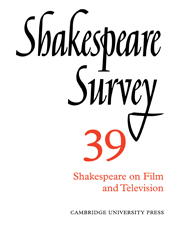Book contents
- Frontmatter
- Shakespeare and the Media of Film, Radio and Television: A Retrospect
- Shakespeare on the Screen: A Selective Filmography
- Chimes at Midnight from Stage to Screen: The Art of Adaptation
- Orson Welles’s Othello: A Study of Time in Shakespeare’s Tragedy
- Macbeth on Film: Politics
- Representing King Lear on Screen: From Metatheatre to ‘Meta-cinema’
- Verbal-Visual, Verbal-Pictorial or Textual-Televisual? Reflections on the BBC Shakespeare Series
- Two Types of Television Shakespeare
- Shakespeare on Radio
- The Dismemberment of Orpheus: Mythic Elements in Shakespeare’s Romances
- Remembering Hamlet: or, How it Feels to Go Like a Crab Backwards
- ‘Then murder’s out of tune’: The Music and Structure of Othello
- The 'Aeneid' in 'The Tempest'
- The Living Dramatist and Shakespeare: A Study of Shakespeare’s Influence on Wole Soyinka
- Shakespeare at Stratford, Ontario: The John Hirsch years
- Shakespeare Performances in London and Stratford-upon-Avon 1984–5
- The Year's Contributions to Shakespearian Study 1 Critical Studies
- 2 Shakespeare’s Life, Times, and Stage
- 3 Editions and Textual Studies
- Index
Orson Welles’s Othello: A Study of Time in Shakespeare’s Tragedy
Published online by Cambridge University Press: 28 March 2007
- Frontmatter
- Shakespeare and the Media of Film, Radio and Television: A Retrospect
- Shakespeare on the Screen: A Selective Filmography
- Chimes at Midnight from Stage to Screen: The Art of Adaptation
- Orson Welles’s Othello: A Study of Time in Shakespeare’s Tragedy
- Macbeth on Film: Politics
- Representing King Lear on Screen: From Metatheatre to ‘Meta-cinema’
- Verbal-Visual, Verbal-Pictorial or Textual-Televisual? Reflections on the BBC Shakespeare Series
- Two Types of Television Shakespeare
- Shakespeare on Radio
- The Dismemberment of Orpheus: Mythic Elements in Shakespeare’s Romances
- Remembering Hamlet: or, How it Feels to Go Like a Crab Backwards
- ‘Then murder’s out of tune’: The Music and Structure of Othello
- The 'Aeneid' in 'The Tempest'
- The Living Dramatist and Shakespeare: A Study of Shakespeare’s Influence on Wole Soyinka
- Shakespeare at Stratford, Ontario: The John Hirsch years
- Shakespeare Performances in London and Stratford-upon-Avon 1984–5
- The Year's Contributions to Shakespearian Study 1 Critical Studies
- 2 Shakespeare’s Life, Times, and Stage
- 3 Editions and Textual Studies
- Index
Summary
With the recent wave of scholarship on Shakespeare on film there is at least one important line of questioning still to pursue: can the film medium serve as a critical tool for interpreting or reinterpreting Shakespeare's work? Is there something to learn, to rediscover, to see in a new light when, to borrow Walter Benjamin's phrase, we have 'the ingenious guidance of the camera' leading us through the text? If, as Benjamin suggests, the camera opens up 'a new field of perception' in this age of mechanical reproduction, how can we apply his notion to the specific instance of a Shakespeare play adapted to the screen?
One film that provides a particularly exciting opportunity for a critical analysis of Shakespeare's work is Orson Welles's Othello. Of Welles's three Shakespeare films - Macbeth (1948), Othello (1952), and Chimes at Midnight (1965) - Othello has received the least critical attention and continues to be one of the most rarely seen of all cinematic adaptations of the plays. But careful study of this film illuminates a thematic aspect of the text that leads to a fresh reading of the play as a whole. Through his use of cinematic technique, Welles has produced a work that emerges as a study of time in Shakespeare's Othello. The insights to be gained from the film concerning this element of the play are of considerable importance for, and can contribute significantly to, scholarship on Shakespeare's great tragedy.
- Type
- Chapter
- Information
- Shakespeare Survey , pp. 53 - 66Publisher: Cambridge University PressPrint publication year: 1987



